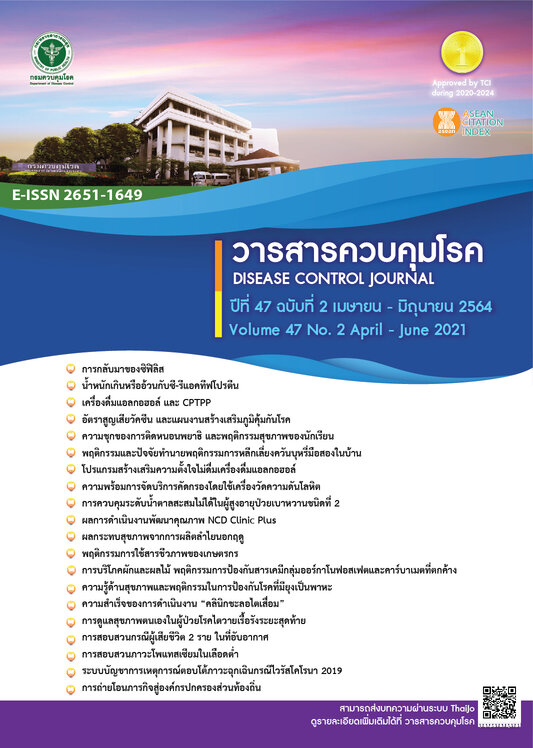Self-care in end-stage renal disease patients who refused dialysis in Uttaradit Province
DOI:
https://doi.org/10.14456/dcj.2021.33Keywords:
self-care, end-stage renal disease, refused dialysis, conservativeAbstract
Currently, conservative management for end-stage renal disease patients who refused dialysis is lacking in patients' understanding of non-medical dimensions. In order to achieve a holistic goal, this study aimed to understand patients’ self-care and the relevant context. A qualitative study was then conducted based on semi-structure in-depth interviews and non-participatory observation with 40 end-stage renal disease patients who refused dialysis in Renal Disease Center at Uttaradit Hospital during March to September 2019. These data were examined using content analysis. The results revealed that most patients could perceive their health status. They understood and took care of themselves in terms of physical, emotional, drug use, diet control and manage with effortlessly complications. The internal factors influencing self-care were physical condition, emotional state, understanding of disease and care, illness representations, experiences and beliefs. The external factors included caregivers, family supports, socio-economic status, health facility and channels for information perception. Therefore, the multidisciplinary team should understand the patients in all dimensions, develop good patient-team relationship, give appropriate and clear suggestions according to the context, promote the use of social media and join with their family to participate in the treatment plans to promote self-care and improve quality of life.
Downloads
References
Kantachuvessiri S, Chancharoenthana W, Kiattisunthorn K, Khachaseni P, Chailimpamontri W, Trakarnvanich T. Textbook of chronic kidney disease. 2nd ed. Bangkok: Text and journal publication; 2019. (in Thai)
Health Data Center. Number of chronic kidney disease patients coming to the hospital classified by stage, fiscal year 2019 [Internet]. Nonthaburi: Ministry of public health; 2019 [cited 2020 Apr 22]. Available from: https://hdcservice.moph.go.th/hdc/reports/report.php?source=pformated/format1.php&cat_id=e71a73a77b1474e63b71bccf727009ce&id=47a33f6886e36962dec4bb578819ba64 (in thai)
The Nephrology Society of Thailand. Clinical Practice Recommendation for Comprehensive Conservative Care in Chronic Kidney Disease 2017. 1st ed. Bangkok: Text and journal publication; 2017. (in Thai)
Abraham C, Sheer P. The health belief model. In: Conner M, Norman P, editors. Predicting and changing health behavior. 3rd ed. America: Typeset by Aptara, Inc.; 2015. P. 30-69.
Unaphak P, Rattanamanee K. The correlation factors of self-care behaviors to prevent complications among patients with chronic kidney disease at Somdetphraphutthalertla hospital in Samutsongkhram Province. PHJBUU. 2015;10:44-54. (in Thai)
Busapavanich S, Dandacha P. Unsuitable medication use behaviour of chronic kidney disease patients. Songkla Med J. 2006;24(4):281-7. (in Thai)
Kongkaew C. Drug use in Thai elderly in lower northern region of Thailand [Internet]. Bankok: Foundation of Thai Gerontology Research and Development institute; 2019 [cited 2020 Apr 22]. Available from: https://thaitgri.org/?p=37010. (in Thai)
Kengganpanich T, Leerapan P, Kengganpanich M, Nunthasen K, Lattanand K. Factors related to herbal consumption for controlling blood sugar of patients with type 2 diabetes mellitus. JHRN. 2015; 31(1):13-25. (in Thai)
Boontoch K, Nuntaboot K. Happiness, Distress and Mental Health of the Elderly in a Community in the Upper North Region of Thailand. J Psychiatr Assoc Thailand. 2017;62(3):257-70. (in Thai)
O'Connor SM, Jardine AG, Millar K. The prediction of self-care behaviors in end-stage renal disease patients using Leventhal's Self-Regulatory Model. J Psychosom Res. 2008;65(2):191-200.
Chongchareon W, Kahawong W, Apichato A, Sangchandr O, Chukumneard P, Boonsin K, Chugnan T. A self-care promotion model for controlling blood sugar in type 2 diabetes. Songkla Med J. 2008;26(1):71-84. (in Thai)
Lambert K, Mullan J, Mansfield K. An integrative review of the methodology and findings regarding dietary adherence in end stage kidney disease. BMC Nephrol. 2017;18(1):318.
Hemman M, Nilmanat K, Matchim Y. Caring for patients with end-stage renal disease receiving palliative care: Muslim caregivers, experiences. pnujr. 2017;9(1):50-9. (in Thai)
Hazara AM, Durrans K, Bhandari S. The role of patient portals in enhancing self-care in patients with renal conditions. Clin Kidney J. 2019;13(1):1-7.
Duangkaew T, Sirasoonthorn P. An Application of Marshall H. Becker’s Health Belief Model [HBM] in the study of hypertension patients in urban communities in Phitsanulok. JCDR-HS. 2017;10(3):101-13. (in Thai)
Downloads
Published
How to Cite
Issue
Section
License
Articles published in the Disease Control Journal are considered as academic work, research or analysis of the personal opinion of the authors, not the opinion of the Thailand Department of Disease Control or editorial team. The authors must be responsible for their articles.






